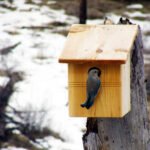The quintessential sound of the morning (aside from the awful cry of an alarm clock) is the pleasant chirp of birds. Since we commonly associate birds with the morning, very few of us consider where birds go at night.
During the day, you see birds nearly everywhere, soaring through the sky, standing on ledges and foraging for food. But once the sun sets, they seem to completely vanish. Sure, occasionally you’ll see an owl fly by or hear a Northern Mockingbird singing all night, but for the most part birds are nowhere to be found.
A question we frequently get from bird lovers is “where do birds sleep at night?” There’s no simple one-word answer to that question because it varies widely among species. We’ll break down a few of the most common places.
Trees and Branches

We’ll start with a pretty common place for birds to sleep: in the trees. Those that choose to sleep in the trees will typically find a dense tree and/or perch themselves up really high. This keeps them sheltered and far away from predators. If a predator does try to sneak up on the bird, the vibrations of it climbing will rouse the bird.
Larger birds like hawks and eagles don’t have to worry about predators too much. They will typically get to a pretty high tree somewhere and perch for the night. Owls do the same thing, only in the day.
Cavities and Birdhouses

Yet another place a bird will take shelter during the night is in a cavity—this includes holes in trees, chimneys, roosting boxes, and birdhouses. The types of species that are already inclined to nest in cavities will typically seek out these enclosed places.
By sleeping in a place like a chimney, the bird will be better shielded from the clawing hands of predators.
Dense Ground Vegetation
Not all birds can fly or get up high in the trees. For those ground-dwellers, like grouses, quails, and pheasants, finding a place to sleep is a little trickier. They’re more in the open, more in danger of getting attacked by prowling cats.
Some ground-dwellers do get up into the trees by flying, but many others will nestle into vegetation. The birds rely on their camouflage and ability to sleep with one eye open to escape the clutches of creatures.
Water
For many birds, water is their best friend. Ducks would be, well, sitting ducks if it wasn’t for the protection of water. Coyotes and other predators could easily prey on the poor ducks and geese, which is why they spend their nights on the water. If swimming predators try to get the sleeping birds, vibrations in the water will stir them.
Shore
Another option for water-dwelling birds is to sleep on the shore. Sometimes ducks and geese will sleep on the shore of small islands or rookeries instead of directly in the water.
Shorebirds, in particular, sleep out on open beaches. The only way they’re not in such danger is due to the fact that they sleep in large flocks. When one stirs, they all stir. Some perching birds will sleep in flocks as well. You may have noticed massive swaths of sleeping crows or swifts. It’s just safer that way.





4 Comments
Ok how do they sleep and still hang onto the branch all night?
That’s a beautiful thought, Maggie
I still want to believe they are more magical then that… I like to think they sleep up in the clouds near the Angels😇 They do say birds are the messengers of the heavens.